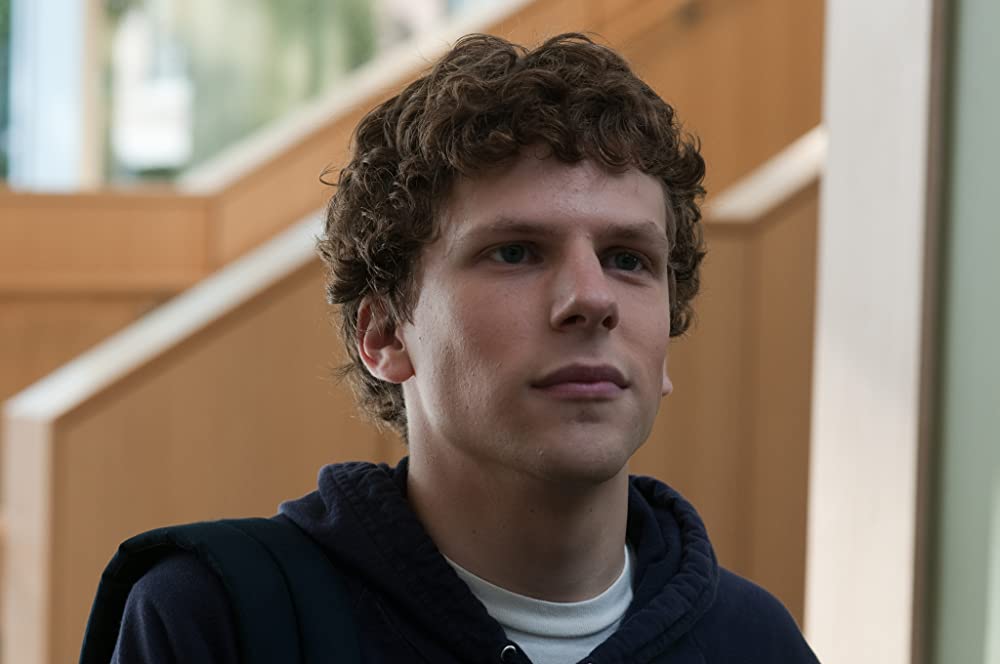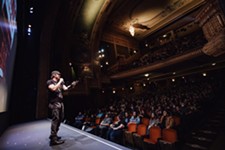Trusting Your Gut: Texas Film Awards Honoree Michael de Luca on a Life in Cinema
From New Line to Warners, the exec discusses his career
By Richard Whittaker, 12:00PM, Thu. Mar. 2, 2023

"I never think about these things," he added. "I'm always head down, concentrating on the thing I'm doing at the time." Again, modestly, he added, "I guess, at 57, I'm entering this advanced age when they start looking at your body of work."
And what a body of work it is. The NYU grad began as a writer on projects like Freddy's Dead: The Final Nightmare and the 1995 version of Judge Dredd, but at the same time he was taking an executive role, under the mentorship of New Line Cinema cofounder Robert Shaye. De Luca himself became president of production at the super-indie, executive producing projects as diverse as The Mask, Blade, Magnolia, and Austin Powers: The Spy Who Shagged Me. Since then he has held leadership roles at Dreamworks, MGM, his own production company, and currently as co-chairperson and CEO (with Pamela Abdy) of Warner Bros. Picture Group, picking up three Oscar nominations along the way (The Social Network, Moneyball, and Captain Phillips).
Now the Fort Worth resident heads to Luck, Texas on Friday, March 3, to be honored by the Texas Film Awards, alongside actors Jonathan Majors (Creed III, The Last Black Man in San Francisco), and Margo Martindale (Cocaine Bear, The Americans) and indie cinema's fairy godparents, Janet and John Pierson.
Austin Chronicle: If you got up there and had to make the argument for why they're giving you this award, what would be your thesis defense of the career of Mike de Luca?
Michael de Luca: This is the hardest question I've ever been asked 'cuz my personality is such that I only think about my mistakes, right?
I always think about the flops, or I always think about what I could've done better. I torture the things that go wrong and I don't enjoy the things that have gone right enough. So I'm a very self-critical. So it's hard to answer this question.
I imagine I might say or it might have something to do with, you know, there has been, I guess you could say at this point a fair amount of career and longevity. So I guess that counts for something. And having relocated part-time to Fort Worth and become like an honorary adopted Texan and having produced an independent movie in Texas, I guess I fit a unique bill of having both the body of work and the career, but also the intersection with local Texas filmmaking
Having come from independent film, starting at New Line, I'm so in line with the Austin Film Society's mission of trying to give new voices and independent filmmakers and beginning filmmakers a shot. I think that's so important to kind of refresh the industry with new talent, every chance you get.
MdL: They were really exciting. I started there when I was still at NYU, film school and I had a great internship and kind of learned the basics of the business. So by the time I graduated, I was able to be hired full-time. And at that time, there was a second wave of independence when I joined the studio as an intern in 1985. There was New Line and Miramax of course, but there was also Vestron with Dirty Dancing, there was New World, there was Atlantic Releasing, there was Cannon. There was a wave of independence fueled by the arrival of VHS.
And there was a period where they all went outta business except for us and Miramax, basically. And then in the nineties there was a DVD boom and that fueled another rise of independents.
In both waves there was a large amount of graduating classes of new filmmakers. So it was exciting to be around all that new talent, you know, whether it was Steven Soderberg with Sex Lies and Videotape, or Paul Thomas Anderson with Us. In that first wave, there was Spike Lee, and Kevin Smith was a beneficiary of the second wave. It was just great to be around, all this emerging talent.
And even movie going, the demographics were shifting from the boomers to Gen X, and you had new audiences that wanted to create their own movie stars and not just inherit, the boomers movie stars. So it was a chance to innovate within genres and, and do a lot of different kinds of movies. So it was really exciting for all those reasons.
AC: What is it that has drawn you to the work that you have done?
MdL: Well, on the executive side, because I was studio executive first, what drew me to that was the chance to kind of curate a large slate and work with a lot of different kinds of filmmakers over the course of a year. The volume of it was really intoxicating to me
On the producing side, a lot of times the producer is there before the director, and either has the idea or has a script, goes to try to find financing if they're not already set up at a studio, then finds a director to come in. When you're a producer as opposed to being an executive, the volume shrinks and you're really building these things piece by piece one at a time. So it's a lot more hands on and artisan than being an executive. And that's also fun. It's just different fun than being, being an executive.
But producers are usually the first people in and the last people out in terms of putting the project together, managing the investment for the studio, the financiers, getting the director through the shoot and post-production, and then presiding over or consulting or managing the release and distribution of the movie with the studio.
AC: And you've also written as well.
MdL: Oh, the writing thing, yeah. I originally went to NYU thinking, that I wanted to be a writer director. And I guess, I tried the writing thing. Yeah. I'm not good at it. It was a tough lesson to learn and it just made me appreciate good writing all the more, so I realized, let me stick to being office management and not frontline creative.
AC: I was talking with Janet and John Pierson, and John said there was this realization he could be involved without being a director. And he said that was kind of this pivotal moment for him.
MdL: I had a very similar experience. Yeah. I thought I'm gonna be a writer director. I was in undergrad film, but my student films were awful. They were awful. So then I thought, "Okay, let me write. Directing's not for me. I'll write." And then I wrote a little bit for New Line, I got things produced, and just saw that they were not of the quality of what I would've liked and just thought, you know, this executive thing might work out for me. So I, I just decided to devote my full attention to that.
AC: It seems like everywhere you've been, it's just a recognizable name, like Dreamworks and Warners. When you look at it from outside, it always feels like it's gonna be this rarefied air. But these are places of grind and work and, you know, kicking the ball on a project 50 yards down the field and suddenly it's 10 yards behind you. I don't think people quite get like the slog of the executive roles.
MdL Yeah. And you know, whether you're executive or a producer, most of the things you work on will never get made. Like it's a very small fraction of the projects that actually come together. And then it's even a smaller fraction of the ones that came together, the ones that work commercially. So you really have to have a thick skin and be able to keep pushing the boulder up the hill no matter how many times it rolls back down.
Because that's just the nature of what we do. It's so amorphous sometimes. It's not like building a chair in a factory or being on assembly line. These things, everyone starts out with the best intentions. Sometimes movies get away from you or you know, for whatever reason they come together and don't work out and you just have to have a thick skin to failure. You know, try to learn what you can and keep pushing forward.
MdL: I agree with you. You know, when theaters were closed all around the world, there was an explosion in streaming for the obvious reasons. I was never a person who thought that wouldn't recede at some point, and I didn't think human behavior would be irrevocably altered and you'd want to just sit on your couch for the rest of your life when it was safe to go out again.
So where we are right now is kind of where I thought we'd end up, which is streaming is here to stay. It's a part of our lives. I'm a consumer, I love it. You know, there are things that I'm happy to watch at home and I love the breadth of series, especially Netflix with all the international stuff they do.
I think on the positive side, it allows for a lot of things to get made that in the old days wouldn't have gotten made. So I think it's a great time for the consumer 'cuz they can really see a wide variety of releases. But I always thought, when the pandemic receded and people felt safe going to movie theaters again, that there would be a return to that practice.
Certain movies are easier to convince people to come out to the theater. I don't think that's necessarily a bad thing. I think it keeps the bar high for quality for those of us that are making movies for movie theaters. When there were no other options and the movie theater was the only option and the DVD business was booming, I think studios got a little lax with quality control – kind of the way the streamers can be now. I think anytime you're playing a volume game, you're not playing a quality control game.
And I think now if you look at the way Wall Street is treating, Netflix and Disney and, and even ourselves, you know, with Warners and HBO Max, the belief that just endless volume would get you endless subscriber growth, that balloon is kind of been punctured. Now Wall Street wants to see earnings and revenue.
So I think the era of volume is over and the era of curation and quality control is here. ... That's the state of the industry right now that, that it's about curation and quality control and there is an audience for theatrical. I think the streaming audience and the theatrical audiences are almost two different audiences and you know, it'll probably stay that way. And I think, you know, I don't think we're gonna lose that hardwired thing inside all of us that makes us wanna experience communal storytelling, at some point in whatever that movie is or whatever that story is. And I don't think it's budget related or, or a spectacle related, but there're just gonna be some things that you're gonna wanna experience sitting in a movie theater. If I knew what that formula was, I'd be a billionaire.
I think exhibition is probably going through a contraction. There'll be a continued shedding of dead screens or screens that just don't gross or bring people in. I think that exhibition is still going through a market correction or a contraction. I think the days of studios making 25 of 30 movies or releasing 25 to 30 movies is probably over. It's just too competitive for premium release dates.
AC: You and I, we're comparable ages, and it's a lot easier to be out and about and to have your finger on the pulse when you are 30 than it is when you are 50. How do you try and keep your finger on the pulse?
MdL: I don't really. For better or worse, I still go with my gut feeling of like what I like and then I pray, I pray that what I like isn't so far removed from what the mainstream likes that I'll be out of a job. At some point I'll get to it an age where I completely miss the boat on like, what, what's going on in the culture. And then they'll put me out to pasture.
If I divorce the reason why I'm doing something from whether I like it or not, it never works out. And god knows I've been wrong with what I've liked, but at least it's an honest, gut instinct of, "Hey, I like this. I think other people will like it too."The 21st annual Texas Film Awards take place March 3 at Luck Ranch. Tickets and info available now at austinfilm.org/tfa
A note to readers: Bold and uncensored, The Austin Chronicle has been Austin’s independent news source for over 40 years, expressing the community’s political and environmental concerns and supporting its active cultural scene. Now more than ever, we need your support to continue supplying Austin with independent, free press. If real news is important to you, please consider making a donation of $5, $10 or whatever you can afford, to help keep our journalism on stands.
April 12, 2024
April 11, 2024
Texas Film Awards, Michael De Luca









